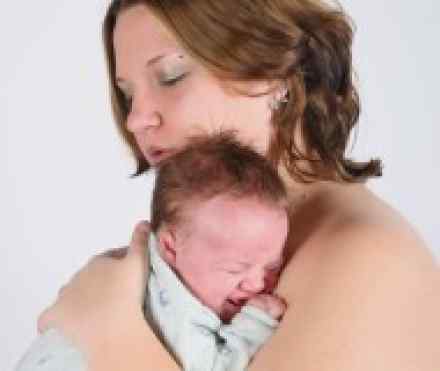
What is it?
- Does your baby seem to spit up a lot? Grab your burp cloth and join the group! Infant acid reflux, more accurately known as gastroesophageal reflux, is a common problem. In fact, more than half of all babies experience infant acid reflux during the first three months after birth, according to the National Digestive Diseases Information Clearinghouse.
- Although infant acid reflux is most likely after a feeding, it can happen anytime your baby coughs, cries or strains. And it's probably tougher on you than on your baby. Even when soaked in spit up, most babies who have infant acid reflux are healthy and content.
- Infant acid reflux typically resolves on its own by ages 12 to 18 months. In the meantime, changes in feeding technique — such as smaller, more frequent feedings, changing position or interrupting feedings to burp — can help keep reflux under control.
Symptoms
Signs of infant acid reflux may include:
- Spitting up
- Irritability during or after feedings
- Poor feedings
Causes
Normally, the ring of muscle between the esophagus and the stomach (lower esophageal sphincter) relaxes and opens only when you swallow. Otherwise, it's tightly closed — keeping stomach contents where they belong. Until this muscle matures, stomach contents may occasionally flow up the esophagus and out of your baby's mouth. Sometimes air bubbles in the esophagus may push liquid out of your baby's mouth. In other cases, your baby may simply drink too much, too fast.
Complications
Most cases of infant acid reflux clear up on their own without causing problems for the baby. Rarely, infant acid reflux can lead to poor growth or breathing problems. Some research indicates that babies who have frequent episodes of infant acid reflux may be more likely to develop gastroesophageal reflux disease during later childhood.
Diagnosis
Diagnosis of infant acid reflux is typically based on your baby's symptoms and a physical exam. If your baby is healthy, content and growing well, tests and treatment aren't usually needed.
If your baby's doctor suspects a more serious condition, such as GORD, diagnostic tests may include:
- Lab tests. Your baby's doctor may do various blood and urine tests to identify or rule out possible causes of recurring vomiting and poor weight gain.
- Esophageal pH monitoring. To determine if irritability, sleep disturbances or other symptoms are associated with reflux, it may be helpful to measure the acidity in your baby's esophagus. The doctor will insert a thin tube through your baby's nose or mouth into the esophagus. The tube is attached to a device that monitors acidity. Your baby may need to remain in the hospital for the monitoring, which often lasts 24 hours.
- Upper GI series. If the doctor suspects a gastrointestinal obstruction, he or she may recommend a series of X-rays known as an upper gastrointestinal (GI) series. Before the X-rays, your baby may drink a white, chalky liquid (barium). The barium coats the stomach, which helps any abnormalities show up more clearly on the X-rays.
- Upper endoscopy. Your baby's doctor may use this procedure to identify or rule out problems in the esophagus, such as narrowing (stricture) or inflammation (esophagitis). The doctor will insert a special tube equipped with a camera lens and light through your baby's mouth into the esophagus, stomach and first part of the small intestine. Samples of any suspicious areas may be taken for analysis. For infants and children, endoscopy is usually done under general anesthesia.
References:
http://www.medicinenet.com/gerd_in_infants_and_children/article.htm
http://www.healthline.com/health/gerd/infants-treatment
http://www.babycentre.co.uk/a567208/reflux-and-silent-reflux
http://www.parenting.com/article/ask-dr-sears-coping-with-babys-acid-reflux
http://www.parents.com/baby/care/gas/best-remedies-for-gas-reflux/
http://www.nhs.uk/Conditions/reflux-babies/Pages/Introduction.aspx
http://emedicine.medscape.com/article/930029-treatment

